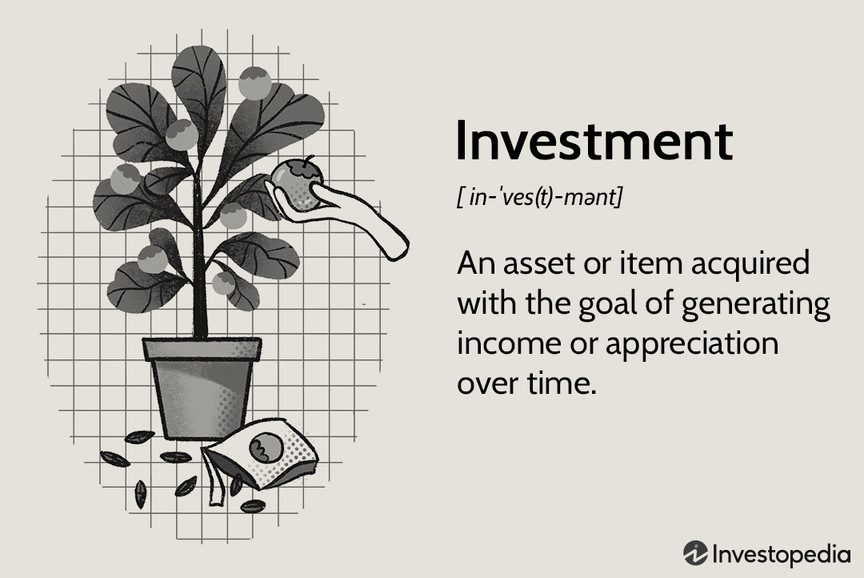Investment Types & Demographics
Evalina Caruccio

What is this portfolio?
A way for people to find the best fit investment for them and their money
This is a step by step presentation of the basic types of investment and what type of financial status would be best fit. It will answer questions like "When is the best time to invest?" and "What stocks would be the best long term investment?" This portfolio is by no means instructions on how to invest your money, merely a guide on the various ways you can watch your money grow. Have fun investing!

Stocks
WHAT IS IT?
There are many different types, but essentially stocks are shares of a company which one can purchase to have partial ownership of said company. Based on the progression of the company, how good or bad they do, that money can grow or deplete. It is common for people to buy stocks through index funds, which are a collection of stocks that have similar focuses and therefore are likely to grow or fall together. Shares are bought and sold on stock exchanges, which are congregations of all the public companies that are selling shares.
TARGET DEMOGRAPHIC
Stocks are best fit for one who is in the financial position to invest money that has the possibility to be lost. There are very few risk free investments and buying and selling stocks is definitely not one of them. The market will consistently fluctuate and there are a variation of stock types that one can invest in. If there is someone who has comfortable wealth that they are willing to risk a portion of, riskier stocks like SPIR, PATH, and DDOG would ultimately give off a larger payout but also would be risking more than someone with more to lose would be willing to. If one is not in the position to risk their funds that much, a mutual fund like an ETF (exchange-traded fund) or an index fund would be a better option. These are bundled stocks that will preserve the likelihood of making a profit off one's investment, but the profit will likely be lower and slower than a riskier stock.
Stock Options
WHAT IS IT?
A stock option is a share that gives the owner the right to sell at a set price but they are not obligated to. The price paid for the options is called a premium, and it's determined by taking the price of the call and multiplying by the number of contracts (100 of the underlying stock) and then multiplying that by 100.There is an agreed upon price between buyer and seller, called the strike price. To exercise an option is to buy or sell at the strike price. Options are typically purchased by investors looking to get ahead of the market or corporations to hedge risk for a specific stock.
THE TWO TYPES
Stock options typically come in two different types, a call option and a put option. A call is a bet that the stock price will rise and a option to buy at a specific price in a specific timeframe. A put option is a bet that stock will fall and is the option to sell at a predetermined price in a select timeframe. Options can be in-the-money (ITM) when they are either under the market price for a call option or over the market price for a put option. An employee stock option (ESO) is a type of call option given as a form of compensation to employees of a company. The options will vest, or become available over time, not be released all at once. They will also come with a cliff that requires the employee to be working with they company for a certain length of time for the options to be released.
Bonds

WHAT IS IT?
A bond is when an investor loans money to a borrower and receives interest of said investment. It is common to think of war bonds in which the government needs money to fund a war and so they sell bonds in which investors buy a bond and are paid back in full plus interest after the war is over. This is also a common strategy for companies that are starting out or going through a hard time. There is a specified amount of time over which the issuer must pay the holder back their investment and the previously agreed upon interest. More common than receiving investment and interest back at the end of the loan however, is when the interest is paid at predetermined intervals throughout the loan and then once the loan is complete the original payment is fulfilled.
TARGET DEMOGRAPHIC
Bonds are inherently a lower risk investment due to the contractual obligation to return payment. Based on the maturity of a bonds, one can amass great interest from the investment but the money is not forver tied up and the bond can be resold for a higher price than the original payment. If one is loooking for a sure return on their investment and a more conservative option than a stock investment, bonds have the financial freedom but far less of the risk. I would reccomend bonds for those getting into investing and wanting to simply test the waters of how their money can grow and not really looking for a huge return right to begin with. Bonds are also positive because the coupon is often tax exempt and as long as one finds a secured bond, it's a surefire way to make a return on your investment.
Commodities
WHAT IS IT?
A commodity is an economic good or resource that is interchangeable in the market. A commodity can be purchased as a future which is when a certain amount is purchased for a certain delivery date so that the price that the resource is will be what is paid for the material. This is a common practice when markets are trending upwards to achieve the lowest cost of materials. There are four main types of commodities that one can invest in: agricultural, livestock, energy, and metals. Energy is one of the most well known types of commodities because it includes crude-oil, natural gas, gasoline, and much more. Resources like this are an important investment due to society's reliance on them and will venture great returns when that resource is needed.
TARGET DEMOGRAPHIC
Most commonly, commodities are purchased by those looking to diversify their investment portfolios or by companies that rely on a certain resource. For example, a company that produces cars would invest in quantities of steel, this would be called a commodity future because it is a purchase of a material to secure steel futures, or the price that steel is currently. Commodities depend on supply and demand, not on other stocks, therefore they are a safe investment when looking for something unrelated to the stock market, These investments are mostly targeted towards companies and wealthier individuals because they are usually so large scale but certainly can be done on a much smaller scale such as purchasing a gold necklace and reselling it years later when it's value has doubled.
Roth IRA
WHAT IS IT?
A Roth IRA is an investment and savings account in which one takes their post tax money and places it into an account. This account will have an interest rate which will allow their money to grow whilst it is invested. However, this is money that can only be accessed once a certain age is reached or there will be penalties. There are exceptions to this rule but it is unlikely to qualify for said exceptions. If one extracts the money after being 59 1/2 years of age and having had the account for longer than five years, the money will not only be theirs to do what they please with, but also will not be taxed. To sum it up, it's a long term investment in which post tax money is put into an account and when that money is taken out, the money will not be taxed.
TARGET DEMOGRAPHIC
The target demographics for a Roth IRA is anyone looking for a very long term investment. A Roth will grow your money greatly, and without taxation, but you will not be able to retrieve it until a certain time. This is targeted more towards people who are looking for retirement savings or savings that they will not need until later in life. When you put your body into a rash, it will never be taxed again, but you will only be able to take it out after 59 1/2 years of age, and after holding the account for at least five years is the best time to start investing is always yesterday I started a Roth early will mean that your money will simply continue to grow product so therefore, the earliest one can invest their money into a Roth is when they should start. However, one must always keep in mind that once their money goes into a Roth, they will not be able to retrieve it until the stipulated timeframe.
Real Estate
WHAT IS IT?
The answer is really in the title, real estate investment is the purchase and management of a sale or rental property. The investment of purchasing the property, whether it's through a down payment with interest or an up front full payment. A primary way that real estate can turn into instant returns on one's investment is through turning a property into a rental property and staying the landlord. Additionally, flipping or renovating a property to resell for a increased profit, receiving a return on the original investment plus the added value of the renovations.
TARGET DEMOGRAPHIC
There are many different types of real estate investment, therefore offering inclusion to a wide variety of persons. Someone with much available disposable income can purchase a property upfront and immediately resell it for a higher value or become a landlord and rent out the property for a monthly income from renters, possibly reaching multiple different buyers. Someone with less available funds but more available time or labor can purchase a lower value house and put labor into it and renovate, reselling for profit. Finally, one who is not willing or able to purchase an entire property can join an REIG (real estate investment group) where a company purchases a block of property, likely apartments or condos, and the investors purchase a unit and the company oversees the lease and takes a portion of the monthly rent.
Investment Fund
WHAT IS IT?
A professionally managed account in which investors pool money to invest together in the fund, reducing the risk attached to investing independently but not eliminating it completely. A professional investment manager decides on what to invest in and uses the money from the fund to buy capital. A fund is chosen by the investor on a few factors: goals, risks, and fees. The goals of duration and payout are weighed against the cost of investment and extra fees from the fund manager by the buyer.
TARGET DEMOGRAPHIC
Funds are one of the few types of investment that have diversified interest due to the wide range of types. Investment funds are targeted but not limited to people with enough money to buy a share but don't necessarily need extra wealth to fall back on due to the reduced risk. However, just because the risk is reduced doesn't mean that there is none; it is still an investment into the stock market with the susceptibility to the market changes. An investor must also be reliable because of the combination of their investment with others. Funds are not the cheapest option due to the added cost of a professional manager, an integral but expensive part of the process.
Types of Funds
Hedge Fund
A limited partnership between select investors managed by a private manager. The fund is made up of alternative assets like commodities or real estate. The fund takes part in trading of both non-traditional assets and stocks to make money for the investors. Hedge funds typically require a high price minimum buy in and are high risk high return investments. They are targeted towards wealthier demographics due to the sheer amount of funding they require.
Mutual Fund
Invests similarly to an investment fund but sells shares which are priced based on the value of the stock purchased by the fund. While an investment fund is private to the investors of the managing firm, a mutual fund is public to anyone who looks to purchase a share. Mutual funds are valued once a day at the close of the market ased on the valuation of the stocks behavior during the day.
Exchange traded fund
A fund in which the stock choices are not picked by a manager but instead track a specific index. commodity, or sector. It is one of the only funds that can be traded on the market like a stock. The price of the fund will change throughout the trading day and fluctuate with the market. It's one of the most liquid funds due to it's ease of selling and buying.
Private Equity Fund
A fund managed by a private equity firm where investors pool their money and the adviser invests on behalf on the fund. Private equity is unique in it's affinity for long term investments, typically taking a minimum of ten years to pay out. They often take a controlling share in a business or company and have a hand in managing the firm, eventually selling. These funds are labelled as private because they are not registered with the SEC and therefore are not required to regular public disclosure requirements.
Annuities
WHAT IS IT?
An annuity is a long-term contract between you and your insurance company where one invests their money into an insurance firm. In return for the investment in the company, you receive regular payments from the insurance company in the form of annuitization or a guaranteed lifetime income benefit. The income stream of return on the investment happens during a set time frame. There are two parts to investing in annuities: the accumulation phase where investors use either a lump-sum or periodic payments to fund the product, and then the receiving end where the investor receives payment for a fixed period or the rest of life.
TARGET DEMOGRAPHIC
Annuities are targeted towards older age groups and those who are worried that they will outlive their savings. The annuity address the risk of one's money disappearing after they pass away and states that if one dies before they start receiving payment, the person they named as their beneficiary will receive a payment. It is also a good investment for anyone looking for a way to invest without taxation, the money one invests is not taxed until the money is withdrawn. They are targeted towards people who want to be conservative with their investments but still have a stream of income in retirement.
How do i get started with investing?
Anyone can invest, the main components needed are time, money, and LOTS of patience.
This project is the basic explanation of all the different types of investment, and now that you are so well versed in all you need to know, you can get started on making your money work for you! Now I'm going to show you what you need to do to get started investing and what levels are available to investors.

Brokers
Who are they?
A broker is an individual or firm who is the go-between for investors and a securities exchange. They charge a commission for their services and help the client find securities and other investment opportunities. A full broker provides investment advice while discount brokers simply trade on behalf of a client, not offering professional advice in any sphere. They must be registered with the FINRA (Financial Industry Regulatory Authority) while investment advisors only have to be registered with the SEC (Securities Exchange Communities). They also might offer access to private stock availabilities when clients use their services.
do i need a broker?
Having a broker, a person who trades on behalf of you and charges a fee for their services is not necessary . However, you must have a brokerage, an online storefront where stocks and bonds are purchased along with other investments. Generally online brokerages charge no fees for buying and selling stocks, they are available to anyone who signs up and creates a portfolio. You need no education license to buy a stock, but it is recommended by many professionals that you take professional advice into account when investing. Series investors, people who buy and sell on behalf of others, must complete exams to acquire a license.
Online Investing


APPs
Many investors starting out will use investment apps like Robinhood, Wealthfront, E-Trade, or Fidelity investments. These apps are a good way to get familiar with the practice of investing but never invest large sums of money through the apps. They are run through big conglomerate companies that charges exorbitant fees on your trading and funnel your information through personal information companies. Each app has differing uses, Robinhood is good for stock trading, Acorn is good for spending, Fidelity is best for low cost investment and so on. While the apps are usually not the best way to invest, they are a fantastic way for people to get introduced to investing nd tracking their securites.
